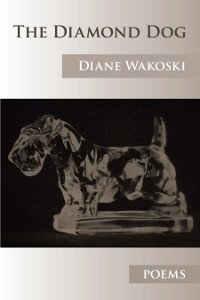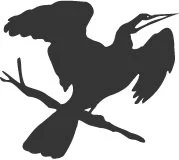
The Diamond Dog by Diane Wakoski
The Diamond Dog, Diane Wakoski’s 19th collection, calls into being a world where the scientific and the mytho-poetic interact and combine. Here, in her first collection of entirely new work since Argonaut Rose (1998), planets move in the perturbed ellipses of warped, Einsteinian space. Yet too, in the realm of the Diamond Dog, stars still turn in their Ptolemaic spheres. Here, the air can be Linden green, Lorca green, and the stem of a carnation can be the line on an astronomer’s spectrograph, the signature of oxygen in some distant star.
Though these intricately-written poems chase outward across innumerable landscapes -- the streets of New York City, the glacier fields north of Juneau, a kitchen on the day of a dinner party, a collapsed star made entirely of diamond, the island of Crete, the kingdom of Colchis, Plato’s cave, a Midwestern college campus, an empty avenue on an afternoon in Majorca -- everything about these poems pulls back toward a center, toward "crystal packed into point." It is a story of separation, absence, and of the Diamond Dog itself, an emissary, searching out what has been lost to the poet.
Diane Wakoski's poetry has always put me in touch with the original and fresh and mysterious lyric impulse I felt when I read her work for the first time 40 years ago. I have re-experienced this awakening with every book of hers, and once again with The Diamond Dog. -- Mark Jarman
She is still an important and engaging poet, one whose bloodlines go back to the early history of contemporary free verse. And this book in particular should have a special relevance for young poets and their teachers, since it shows how, through personal mythmaking, one can bring out of the heat and pressure of one's life a hidden beauty. -- David Kirby (Christian Science Monitor)
Red Tether
A boy in some Dickens school
tipped his inkwell
and poured out a continent
of black sail, lines flapping as
a map crackled
in her luggage. Thrust and parry.
Tight,
a bud, a parachute,
the crystal still packed into point,
the miniature ship,
lines collapsed, before
it's in the bottle.
Puffy coat,
a trip to the Azores,
the carnation she found while walking
her dog on the lake,
its stem a green line of oxygen,
the dog's leash a Red Giant,
the fog off the lake that rendered thoughts
of disappearance,
none of this relevant to the lost pilot or
the girl visited --
a visitation! --
on the beach by Amelia Earhart,
whose navigator went down with her,
but of whom we never speak.
My Diamond Dog, never
on a leash, it's always
running away.
Her dog
is visibly tethered to her,
the Martian line glowing on a foggy beach.
The Silver Locket
On the hillside where goats threaded their way
through rocks, their
bells making the sounds of rattling
keys, she awoke with a silver locket.
Inside this silver dollop was the face of a Greek mariner
who loved her. Rags
left from the wedding so many years ago,
before her enchantment, hung
around her waist. A scrap
of dancing shoe embraced
her foot.
She couldn't
remember why they said the stars turned in crystal spheres
or that fire was invisible, but she danced
in cream satin shoes, she remembered;
and my little black shoes were gleaming crow feathers,
or the noses of seals, or jet or onyx lamps filled with oil,
the kind Aladdin found.
After the library at Alexandra was torched, there were
eight centuries of brindled flocks.
She, who was my mother and told me this story,
as I sat by the smudge-leafed orange groves
and watched black and gold spiders make webs,
had come through a portal,
a cone,
and thus awakened
with only the silver locket.
The rosebush was part of the story, and the
Diamond Dog who ran through the
yard one evening at dusk. Reading
of Queen Ann's Lace, she told me
I was a princess.
The locket held a picture of my
father, an Argonaut sailor,
when centuries were just buttons of pearl,
and time hung around her neck
like this silver locket.
Walking
Music's a wood you walk through.
-- David Mitchell, Black Swan Green
White scarf, woolen, Sarah's gift from Argentina
where she learned to tango, is around
my neck,
and I am walking on Tolstoy's estate, more
than a hundred years ago,
a girl with feet
as small as cornets or bugles, shaped
like ermine, or lab mice,
nicely shaped,
those feet. But it's the white wool, a harness
of bells, a knitted gliding step
into passion
that fills the woods. Russian novels, Rachmaninoff
concertos, cheeks that are pomegranate
red: these are conjured
by the branches, stripped for winter, the way they will
crackle as kindling when starting a fire behind
the grate where
my foot will rest as I scrape the rime off
my walking boots and unlace them.
When I enter the
drawing room stocking-footed, the Diamond Dog will be
lying
on the hearth. Maybe this is a
story by Chekhov, not a Tolstoy novel,
though what I
am really hearing is music and no path through it.
The witch's house is not far, I am
told, but why
should I want to go to a fairy tale? It's the cup of smoky
Russian Caravan tea that I'm hoping
for, and someone,
not imaginary, to drink it with.

